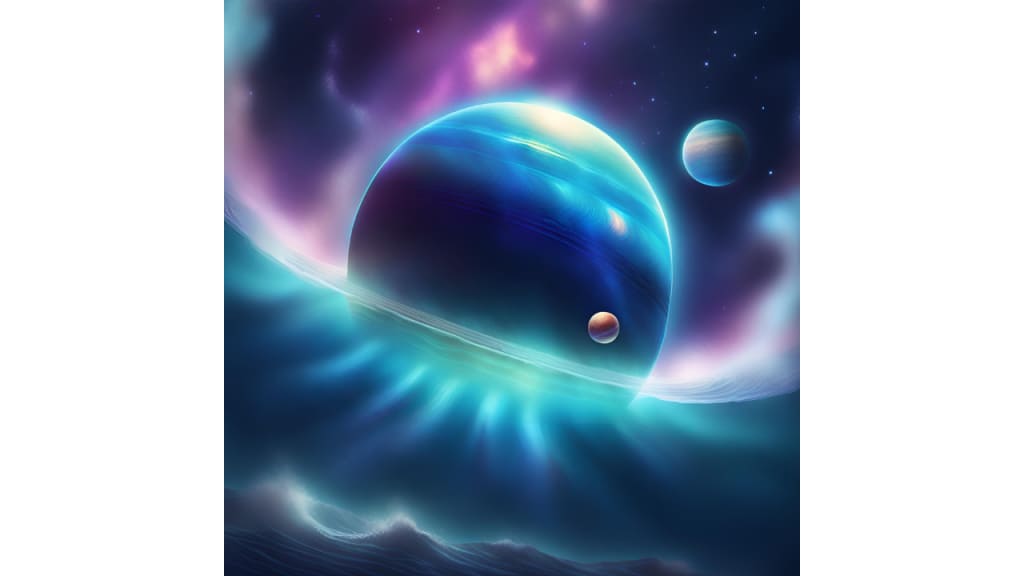A Wild Dive into Neptune
What Would Happen If You Fell In?

Neptune, the big blue giant of our solar system, might seem calm and breathtaking from afar, but don't be fooled. It's a dangerous and violent place. So, who's up for a field trip?
In 1989, NASA's Voyager 2 spacecraft gave us a glimpse of Neptune, and later, with the Hubble Space Telescope, we captured incredible images of this distant planet, which is 4.3 billion kilometers away from Earth. Neptune might look like a fun place to visit, but it's not your ideal vacation spot. Here's what would happen if you fell into Neptune.
Neptune's Composition:
First things first, Neptune is nothing like Earth. About 80 percent of this planet is made up of an icy substance consisting of water, methane, and ammonia. So, where should we take the plunge? Let's start by avoiding the big dark spot on Neptune; it used to be much larger and contained the entire Earth. Neptune's violent storms are nothing to mess with.
What's Around Neptune:
Just like Saturn, Neptune has a ring system, although it's not as extensive. There are at least five main rings, and astronomers have observed strange clumps of dust called arcs. These peculiar formations might be caused by Neptune's moon Galatia and its gravitational disruptions. In addition to Galatia, Neptune has 13 other moons.
Choosing Your Landing Spot:
For the sake of our hypothetical journey, let's descend into Neptune's northern hemisphere, where the winds are tamer. Unlike Earth, different parts of Neptune rotate at varying speeds, leading to varying day lengths. At the north pole, a day lasts 12 hours, which is six hours shorter than a day on the equator.
Survival Essentials:
Keep in mind that Neptune's atmosphere lacks oxygen, so bring an ample supply to breathe. With very little sunlight, the brightest Neptune gets is like a dim twilight on Earth, so packing a light source or night vision goggles is crucial.
Challenges Along the Way:
Prepare yourself for incredibly strong winds, reaching speeds of up to 550 meters per second. That's about five times stronger than the strongest gusts on Earth and twice as fast as the speed of sound.
As you pass through Neptune's exosphere, your spacesuit will experience freezing temperatures as you drift through methane clouds. And yes, it might not smell very pleasant.
The Journey Continues:
Neptune's weather can be unpredictable, much like certain places on Earth. As you reach the thermosphere, the temperature suddenly rises to about 477 degrees Celsius, and you'll encounter ammonia and hydrogen sulfide clouds. Astronomers believe this temperature bump is due to the atmosphere's interaction with ions in Neptune's magnetic field.
Deeper Dive:
Descending further, you'll notice an increase in pressure in the stratosphere. As you get closer to Neptune's core, temperatures rise rapidly. You'll pass through Neptune's 3,000-kilometer thick hydrogen and helium atmosphere, but don't worry about crashing into the ground because Neptune doesn't have a solid surface. Instead, it's more like a slushy ice and water layer about 17,500 kilometers deep.
Hidden Treasures:
If you were hoping for a spectacular view, I'm sorry to disappoint. The atmosphere here is too dense to see anything. But as you finally pass through all the slush, you'll encounter a super-hot ocean and possibly some hidden treasures. Due to the high pressure and temperature on Neptune, carbon and hydrogen atoms might separate, forming isolated carbon atoms squeezed into diamond structures. These diamonds could be as large as one meter in size. Who knew Neptune had so much bling?
The Core:
In the core, temperatures are scorching hot, about 7,000 degrees Celsius, which is comparable to the surface of the Sun. Realistically, a human probably couldn't survive this journey, but maybe a resilient space probe could.
Conclusion:
Now that we've got our sea legs, perhaps we could explore Jupiter next. Think you could handle it? Well, that's a story for another chapter. Stay tuned for more exciting adventures through the cosmos!
About the Creator
Qandil fatima
Curious explorer of Earth's mysteries and space's enigmas. Join me on a cosmic odyssey through captivating stories. 🌌🚀👽






Comments
There are no comments for this story
Be the first to respond and start the conversation.